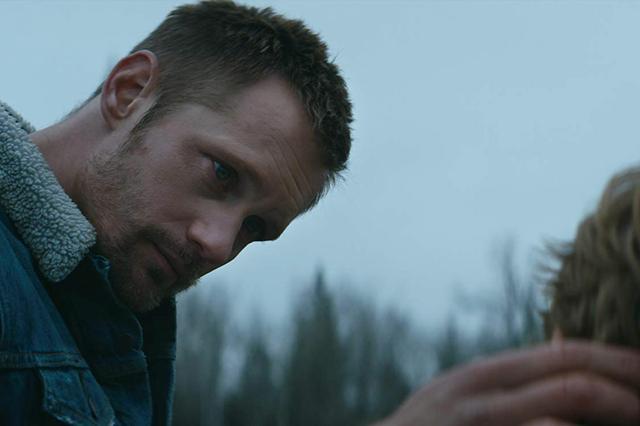
************************This review contains spoilers****************************
“When resources are scarce or when there are unnatural stressors, the young will be killed in order to preserve the pack. It’s called savaging.”
Hold the Dark takes us to a fictional remote village in Alaska named Keelut amidst a crisis involving wolves that are kidnapping and killing children. Medora Sloane’s (Riley Keough) child Bailey (Beckam Crawford) is soon taken and stricken with grief, Medora asks writer and researcher Russell Core (Jeffrey Wright) to come to Keelut and hunt the wolf responsible. After arriving in the cold, snowy Alaskan wilderness, Core soon finds himself at the center of a bloody mystery that also involves Medora’s husband and war veteran Vernon (Alexander Skarsgård) who has embarked on a hunt to avenge his son and punish all who are involved with his death.
Hold the Dark‘s narrative and theme aren’t made very clear in the film which contributes heavily to the slog and drag that watching the film feels like. This isn’t to say that there is no exploration of a larger point present, the film is attempting to make a point about the savage nature that still exists within humanity and the depths to which we can all be pushed under difficult circumstances or in the interests of self-preservation. The pull quote at the introduction of this review is a summation of this point. Although Russell made the statement in the context of a pack of wolves eating one of their own, the quote has an obvious parallel with the events that unfold onscreen. In an interview with Thrillist following the release of the film, director Jeremy Saulnier addressed the confusion surrounding the film and its ending that sees Medora and Vernon abscond together despite her having actually killed Bailey and Vernon’s having killed all who were involved in the periphery of his death. Hold the Dark is based on a novel of the same name and in that novel, it is revealed that Medora and Vernon are twins. The film hints at this through some of the dialogue but Saulnier chose to nix the scene he shot that explicitly shows this, opting instead to hint at both it and Medora’s motivations in order to reward attentive viewers and maintain the power of the narrative about our brutal nature and the lengths humans will go to save themselves.
This is normally a choice I would be behind one hundred percent, as I love films that are subtle and reward those who pay attention. Yet, I left Hold the Dark feeling as if the points laid out above weren’t hinted at strongly enough to allow viewers to follow Saulnier down the path he was taking. While I was able to catch on to the point about savagery and what lengths we are capable of going to in order to protect our loved ones and ourselves (something that is also hinted at in a quality flashback scene where Vernon explains to Bailey why he’s going off to war to kill people even though Bailey has been taught that killing is wrong), the familial connection between Medora and Vernon that resulted in their reconciling despite Vernon’s clear lust for revenge for Bailey’s death was hard to make out despite the hinted dialogue littered throughout. Medora remarking on there not being “a memory that he isn’t in” wouldn’t make someone automatically jump to the conclusion that her husband is in fact her twin brother. While providing the viewer with the puzzle pieces to put together themselves is my preferred modus operandi for directors, some semblance of light must be made present in the room so that the person can see well enough to complete the puzzle in the first place. Having to read a publication post-viewing in order to receive full context and explanation shouldn’t be required, but more like an added bonus.
Almost all of the performances in the film are muted and quiet, with capable actors like Keough and Wright coming across onscreen as if they’re just going through the motions. Both Keough and Wright’s considerable skill sets aren’t on full display due to the subdued way their characters were presented. On the other hand, Alexander Skarsgård’s performance contains much of the same silence, but he adeptly brings forth the quiet intensity of Vernon. As he makes his way through Alaska, slaughtering all who have even a tepid connection to his wife’s misdeed and the death of his son, the thirst for vengeance feels all too real but also contains a tinge of understanding for the viewer. Losing a child in such a brutal way, particularly coming off of the heels of the brutality of war, can drive a person to do savage things. The cinematography present in the film also stands out, as the frozen forests of Alaska are on full display in all of their majesty and presented in a way that feels as if the viewer is being placed right in the middle of a cold winter. Hold the Dark also features work with real wolves in place of any CGI or VFX work, an aspect of its production that must also be commended.
While Hold the Dark does feature a decent portrayal and commentary on how brutal of an animal mankind can still be, and a stellar cast with a notable performance from Skarsgård, the too subtle nature of its mysterious plot made this a watch that was more befuddling and disappointing than pleasing. This fact was all the more hurtful to point out due to the involvement from indie heavy hitters Saulnier and the film’s screenwriter Macon Blair, both of whom have made some of the more notable independent films of the past five years like Blue Ruin, Green Room, and the criminally overlooked I Don’t Feel at Home in This World Anymore. Despite their stellar track record and the attempt here, Hold the Dark just fails to connect in a satisfying way.
Image: Netflix

